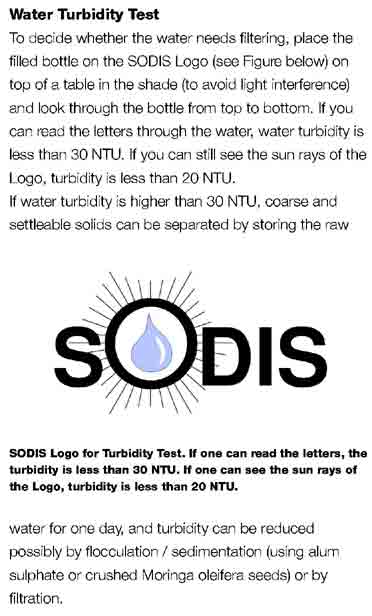How to Pasteurize Water with a Plastic Bottle
Contents
Short Description
- Problem: Fighting diarrhea and water transmitted diseases
- Idea: Using the combined action of UVA radiations and of pasteurization temperature buy putting rather clear water in a transparent bottle in the sun for a day.
- Difficulty: Only for small amounts. Doesn't treat chemical polution. Doesn't change the colour, the odor or the taste of the water. Clean storage and quick use once opened.
- Material Needed: Transparent plastic bottles with their cap. (black paint)
- Geographic Area: Sunny areas best.
- How Many people? One person
- How Long does it take? 20 min the first time + laying in the sun time ( between 6 hours and 2 days)
Description
SODIS is cheap and practical water treatment method which uses solar energy to improve the microbiological water quality. It is used at household level to treat small quantities fo drinking water. SODIS was developed by the EAWAG Institute in Switzerland and is promoted by SANDEC.
SODIS is ideal to treat small quantities of water.
Contaminated water is filled into transparent plastic bottles and exposed to full sunlight for six hours.
The water has to be relatively transparent ( low turbidity). If it is not the case, you should filter the water first till it is possible to read the Sodis Logo through the bottle.  .
.
To pre-filter the water, see for exemple How to Lower Water Turbidity with a Roughing Filter
Fill the bottle 3/4 and shake it to let more oxygen dissolve in the water. This ameliorates the UV action. Then fill the bottle completely and lay it in the sun. Best is if you can lay it on a dark surface orientated to the sun, or even paint half of the bottle black, and present the transparent part to the sun.
Difficulties
Only for small amounts. Doesn't treat chemical polution. Doesn't change the colour, the odor or the taste of the water. Clean storage and quick use once opened.
Success Story
Plans, Illustrations, Posters
Contacts
Links
www.sandec.ch
www.sodis.ch
Bibliography
Related articles
- How to Filter Water with a Sand Filter
- How to Lower Water Turbidity with a Roughing Filter
- How to Make a Coffee-Clay Water Filter
- How to Pasteurize Water with a Plastic Bottle
- How to Test if Water Is Pasteurized
- Water Supplies for Food Processing
- How to Purify Water with Moringa Seeds
- How to Purify Water With Solar Distillation
- How to Improve Water Quality Using Vetiver Grass
- How to Purify Water with Chlorine Tablets
Categories
- Stub
- Food Poisoning and its Prevention
- Health
- Hygiene
- Prevention
- Recycling
- Resource Management
- Sanitation
- Water
- Water harvesting
- Water purification
- Sun
- Easy
- Global Technology
- Arid Climate
- Forest Environment
- Global
- Mediterranean Climate
- Monsoon Climate
- Montaneous Environment
- Coastal Area
- Lakes and Rivers
- Rural Environment
- Temperate Climate
- Tropical Climate
- Urban Environment
- Less than 10 US$
- Glass
- Plastic container
- One Person and more
- Household
- Village
- Neighbourhood
- School
- Application
- Howtopedia requested drawings
- Howtopedia requested images